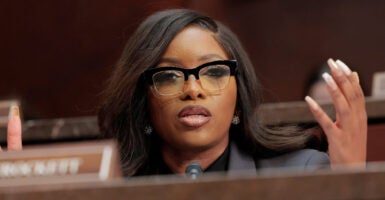Wednesday’s House DOGE Subcommittee hearing on bias at NPR and PBS got heated at times, especially for NPR CEO Katherine Maher, whom Republican members repeatedly put on the spot for far leftist comments she has made. But at one point, Rep. Jasmine Crockett, D-Texas, turned her fire on me.
As is usually the case with the Dallas demagogue, she got things wrong.
During her time to speak, Crockett said, “The Republican’s witness, Mr. Gonzalez, went so far as to suggest that because NPR and PBS reported on the murder of George Floyd they, quote, ‘represent a danger to our physical health as well as to civic health of our body politics.’”
Then she engaged in a bit of theater—to the surprise of nobody—asking the two star witnesses, Maher and PBS CEO Paula Kerger, if they agreed with that.
“Ms. Maher, do you think reporting on the murder of George Floyd and highlighting instances of systemic racism is a domestic threat to America?”
Ms. Maher duly responded, “Thank you, congresswoman. I believe it’s our responsibility to report on all issues of interest to the American public.”
When asked the same question, Kerger, too, responded, “I agree. I think it’s important for us to report on the important news of the day.”
But I, a former reporter, would never suggest that reporting on such an event represented a danger. Rather, I chastised NPR for fully embracing—unquestioningly—the narrative that America is an oppressive society gripped by “systemic racism,” which became holy writ post-Floyd.
In that I was quoting none other than NPR whistleblower Uri Berliner, a 25-year veteran of NPR, whose devastating take down of the network last year was cited over and over at the hearing.
In an essay for the Free Press, Berliner wrote,
Given the circumstances of Floyd’s death, it would have been an ideal moment to tackle a difficult question: Is America, as progressive activists claim, beset by systemic racism in the 2020s—in law enforcement, education, housing, and elsewhere? We happen to have a very powerful tool for answering such questions: journalism. Journalism that lets evidence lead the way. But the message from the top was very different. America’s infestation with systemic racism was declared loud and clear: it was a given. Our mission was to change it.
In my written testimony to the subcommittee, I said:
Finally, after the death of George Floyd and the ensuing riots led and organized by Black Lives Matter in 2020, NPR firmly took the side of those small but influential segments of society that affirmed, without a shred of evidence, that America is an oppressive society gripped by systemic racism. I have already told you of my experiences reporting from overseas, and I can add that I have lived at least a year in seven countries, visiting many others. This month alone, I have visited Peru, Mexico City, Paraguay, and Panama. Next month I will address a group in Valencia, Spain, and the month after that I plan to visit Paris, Budapest and Warsaw. I can compare and contrast, in other words. I can affirm to you now that, no, we are by no means an oppressive society and that, while of course ugly racists do exist, as they do in any countries (sic), America is not systematically racist. These are vile lies told to further a political agenda.
If NPR, or PBS, for that matter, were true public services, they could have acted to save the country from much of the damaging, self-inflicted hysteria that followed. A couple of pages later in the testimony, I wrote, “NPR, according to (a) veteran of a quarter century, actively worked to topple an elected, sitting President; obfuscated on matters of public health; and fanned the flames of extremism, encouraging violent acts. NPR’s bias, therefore, is not just an annoying attitudinal stance that we can just look away from: it represents a danger to our physical health as well as to the civic health of our body politics.”
These were the parts of my testimony that got Rep. Crockett so exercised. But she either read them wrong, distorted the content, or simply lied. Lacking godly powers to divine the contents of her heart, I do not know which.
But I did want to set the record straight, which I couldn’t do during the hearing because of how hearings are conducted, even though Chairwoman Marjorie Taylor-Greene did try to give me the opportunity.
This is also another useful reminder that NPR does not practice journalism, but distorts it to achieve a political agenda, the main reason why the Trump administration must defund it.
































